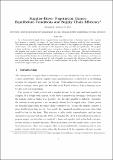Supplier-Buyer Negotiation Games: Equilibrium Conditions and Supply Chain Efficiency
Author(s)
Martinez-de-Albeniz, Victor; Simchi-Levi, David
DownloadSimchi-Levi_Supplier-buyer.pdf (239.6Kb)
OPEN_ACCESS_POLICY
Open Access Policy
Creative Commons Attribution-Noncommercial-Share Alike
Terms of use
Metadata
Show full item recordAbstract
In a decentralized supply chain, supplier–buyer negotiations have a dynamic aspect that requires both players to consider the impact of their decisions on future decisions made by their counterpart. The interaction generally couples strongly the price decision of the supplier and the quantity decision of the buyer. We propose a basic model for a repeated supplier–buyer interaction, during several rounds. In each round, the supplier first quotes a price, and the buyer places an order at that price. We find conditions for existence and uniqueness of a well-behaved subgame-perfect equilibrium in the dynamic game. When costs are stationary and there are no holding costs, we identify some demand distributions for which these conditions are met, examine the efficiency of the equilibrium, and show that, as the number of rounds increases, the profits of the supply chain increase towards the supply chain optimum. In contrast, when costs vary over time or holding costs are present, the benefit from multi-period interactions is reduced and after a finite number of time periods, supply chain profits stay constant even when the number of rounds increases.
Date issued
2012-07Department
Massachusetts Institute of Technology. Department of Civil and Environmental EngineeringJournal
Production and Operations Management
Publisher
Wiley Blackwell
Citation
Martínez-de-Albéniz, Victor, and David Simchi-Levi. “Supplier-Buyer Negotiation Games: Equilibrium Conditions and Supply Chain Efficiency.” Production and Operations Management 22.2 (2013): 397–409.
Version: Author's final manuscript
ISSN
1059-1478
1937-5956